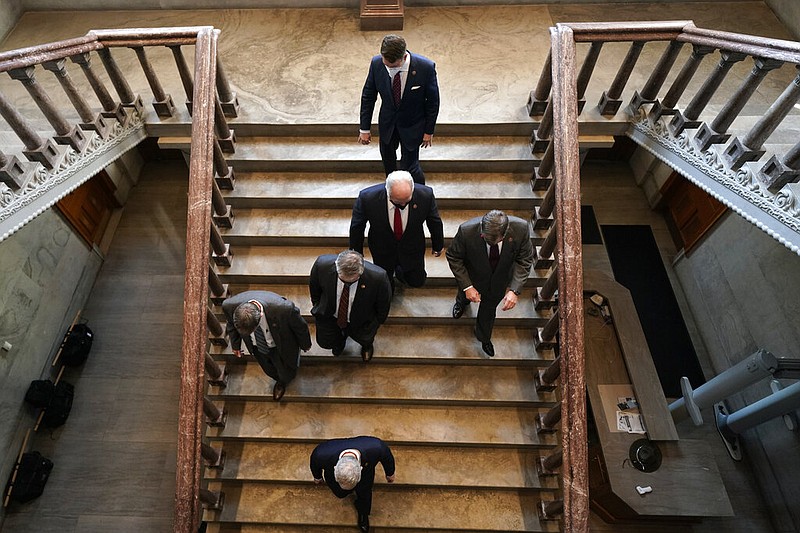NASHVILLE - State senators gave nods Monday to proposed Tennessee constitutional amendments that, if agreed to by the House, would put before voters next November decisions over whether to enshrine the state's current "right to work" law in the Tennessee Constitution along with a second amendment effectively giving legislators veto power over who gets appointed state attorney general.
The Senate's GOP supermajority voted 23-7 on the proposed "right to work" amendment, Senate Joint Resolution 2, setting it up for a later vote in the Republican-controlled House, where it is expected to pass. The provision of law bars employers from requiring union membership as a condition of employment.
Sen. Todd Gardenhire, R-Chattanooga, who has sometimes sided with labor unions, was the lone Republican to vote no.
Tennessee's law, enacted in 1947, bars efforts to deny or seek to deny employment to any person by reason of the person's membership in, affiliation with, resignation from or refusal to join or affiliate with any labor union or employee organization of any kind.
"I've witnessed first hand what an advantage we have with this law on the books," Sen. Brian Kelsey, R-Germantown, told colleagues, later adding that businesses considering locating in Tennessee "look very much at whether our state is one of right to work."
Sen. Sara Kyle, D-Memphis, called "right to work" a "false slogan," adding that "what really happens is workers make less." That "may be good for Wall Street and big corporations, but it's not good for Tennesseans."
Noting Tennessee workers make $10,000 less annually than workers in states that don't have such a law, Kyle said if the proposal becomes part of the Tennessee Constitution, it would prevent future legislatures from revisiting the issue. It "further destroys the power and the freedom of elective collective bargaining" which Kyle said has "lifted millions out of poverty."
Kelsey argued for the need of enshrining the provision in the state Constitution, saying it would bar "activist judges" from weakening the provision. He cited an Indiana judge's 2013 ruling declaring that state's law unconstitutional. It was later overruled by the Indiana Supreme Court.
ATTORNEY GENERAL SELECTION
Earlier, senators approved Senate Joint Resolution 1, which gives the General Assembly a voice in the attorney general confirmation process, on a 25-7 vote.
Sen. Ken Yager spoke in support of his SJR 1 that seeks to give the General Assembly say-so over Tennessee's unique process for selecting its chief law enforcement officer, the state attorney general.
While many states such as Georgia directly give voters the decision over who becomes their state attorney general, the Tennessee Constitution since 1870 has put the decision in the hands of the state Supreme Court, which formerly was popularly elected.
Later amendments to the Tennessee Constitution have sought to shield justices from the hurly-burly of competitive elections, and they are now appointed. Voters later weigh in on whether they remain in office in retention election votes.
The state high court's selection process is done behind closed doors. Since they assumed power, legislative Republicans have bristled at some decisions made by attorneys general.
Current Tennessee Attorney General Herbert Slatery, a Republican and former top adviser to then-Republican Gov. Bill Haslam, has sometimes been criticized for not taking on causes near and dear to conservative Republicans but more recently has come under criticism for what Democratic critics charge is joining conservative legal crusades.
Yager said the proposed constitutional amendment would bring needed transparency to the process by giving legislators final approval over the attorney general's appointment.
Senate Minority Leader Jeff Yarbro, D-Nashville, argued that "if the attorney general can only get re-elected by coming back to the General Assembly, I think there's some risk we're getting the advice we want versus the advice that we need."
The proposed amendment's effect is "putting ourselves in the middle of a process where you need some separation," Yarbro said.
Senate Judiciary Committee Chairman Mike Bell, R-Riceville, said 43 states have popularly elected attorneys general. Five are chosen by governor while Maine legislators elect theirs, he said.
Bell called Yager's proposal a "compromise, truly" where independence of the position is maintained "but you have the people through their elected representatives" weighing in.
The attorney general is appointed to an eight-year term.
SLAVERY AS PUNISHMENT
Senators also held their first reading on Senate Joint Resolution 80. Sponsored by Sen. Raumesh Akbari, D-Memphis, it seeks to remove "punishment for crime" as an exception to the state's prohibition of slavery and involuntary servitude. While removing slavery as a punishment, it would preserve the state's right to administer work programs for prison inmates.
Under the state's lengthy process for putting an amendment before voters on the ballot, Akbari's proposed amendment must be read three times. Then it would have to pass the current General Assembly by a majority vote. It then would go through the same process in the next General Assembly taking office in 2023. But it would require two thirds approval before getting onto the 2026 ballot for voters to consider.
Contact Andy Sher at asher@timesfreepress.com or 615-255-0550. Follow on Twitter @AndySher1.

